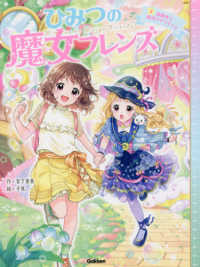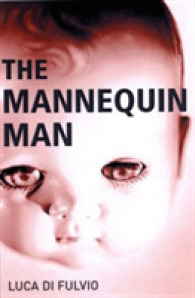- ホーム
- > 洋書
- > 英文書
- > Literary Criticism
Full Description
Can it be ever possible to write about war in a work of fiction? asks a protagonist of one of Makine's strongly metafictional and intensely historical novels. Helena Duffy's World War II in Andreï Makine's Historiographic Metafiction redirects this question at the Franco-Russian author's fiction itself by investigating its portrayal of Soviet involvement in the struggle against Hitler. To write back into the history of the Great Fatherland War its unmourned victims — invalids, Jews, POWs, women or starving Leningraders — is the self-acknowledged ambition of a novelist committed to the postmodern empowerment of those hitherto silenced by dominant historiographies. Whether Makine succeeds at giving voice to those whose suffering jarred with the triumphalist narrative of the war concocted by Soviet authorities is the central concern of Duffy's book.
Contents
Preface
Acknowledgments
Author's Note
Abbreviations of the Titles of Andreï Makine's Novels
Introduction: Andreï Makine, the Great Fatherland War, the Historical Novel and (Russian) Postmodernism
1 Andreï Makine's Novels as Historiographic Metafictions
Introduction: from Architecture to Metafiction
The Orphans of History: The Good German, the Kind Ivan and the Virtuous 'Mobile Field Wife'
Historicity, Rewriting and Nostalgia
Can It Ever Be Possible to Write about War in a Novel?
Veracity vs. Verisimilitude
The Textuality of Knowledge, the Limits of Cognition and the Role of Documents in Historical Inquiry
'The Presence of the Past'
The Politics of Andreï Makine's Fiction
2 The Hero of the Soviet Union: From Victor to Victim
Introduction
The Soviet Union Is No More — Its Heroes Live On
The Intelligible Body
Ivan's Childhood
Fathers, Mothers and Sons
Ivan in the Mirror
Ivan's War(s)
Speak, Memory
From Berlin to Beriozhka
Conclusions
3 The War Invalid: The Samovar, the Kommunalka and the Docile Body, or the Dialectic of Fragmentation and Plenitude
Introduction: 'The Heroic Flotsam and Jetsam of History'
Written on the Body
The 'Ugly Vestiges of the War': Sasha Semyonov and Pyotr Evdokimov
The Amputee and the Fragmented Narrative
The Poetics of Fragment: Archaeology and Fresco Painting
The Common Places: The Communal Apartment and Courtyard
Charlotte, Put the Samovar on
Requiem for the Lost Empire
Conclusions
4 The Jew: Between Victimhood and Complicity, or How an Army-Dodger and Rootless Cosmopolitan Has Become a Saintly Ogre
Introduction
The Holocaust as a Non-Event and Russian/Soviet Anti-Semitism
The Jew as the Postmodern Other
There Are Jews in Makine's Oeuvre but There Is No Jewish Question
The Kholokaust and the Grey Zone
'Jews Are Fighting the War in Tashkent'
The Jew's Redemptive Phoria
From Superfluous Man to Homo Sovieticus
Conclusions
5 The Blokadnik: A Saintly Prostitute or a Heroic Defender of Leningrad?
Introduction
Taking the Piss out of the Blockade
The Homo Sacer: Steadfastness, Solidarity, Sacrifice, Sostradanie and Serenity
Leningrad's Saintly Prostitutes
The Siege as a Gendered Experience: Heroic Fighters and Holy Blockade Women
'All for One and One for All'
The City of Culture or the Uncanny City
No One Is Forgotten
Conclusions
Conclusions. Writing History of World War II as a Prophet
Bibliography
Index







